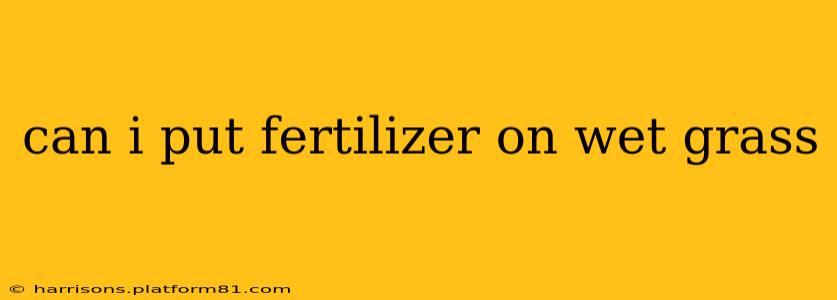Can I Put Fertilizer on Wet Grass? The Definitive Guide
The question of whether you can fertilize wet grass is a common one among homeowners striving for a lush, green lawn. The short answer is: generally, no, you shouldn't fertilize wet grass. However, there are nuances to this answer that we'll explore in detail. Understanding the reasons behind this recommendation will help you optimize your lawn care routine for maximum effectiveness and avoid potential problems.
Why You Shouldn't Fertilize Wet Grass
Applying fertilizer to wet grass can lead to several negative consequences:
-
Uneven Distribution: Water on the grass blades and soil prevents the fertilizer granules from sticking properly. This leads to uneven distribution, meaning some areas receive too much fertilizer while others receive too little. This can result in patchy growth and potentially burn areas that receive an excessive dose.
-
Runoff: Excess water can wash away the fertilizer before it has a chance to be absorbed by the soil. This runoff contaminates waterways, harming aquatic life and contributing to environmental pollution. It also means you're wasting your fertilizer and money.
-
Burning: Concentrated fertilizer granules that remain on the grass blades after application can cause burning, particularly if it's a high-nitrogen fertilizer. The wet grass acts as a conduit, allowing the concentrated fertilizer to directly contact the sensitive leaf tissues.
-
Reduced Effectiveness: The fertilizer granules need to dissolve and penetrate the soil to be absorbed by the grass roots. Excess water can hinder this process, reducing the overall effectiveness of your fertilizer application.
When Is It Okay to Fertilize?
The ideal conditions for fertilizing your lawn are when the grass is dry and the forecast predicts no rain for at least 24 hours. This allows for proper absorption and prevents runoff. The best time of day is typically early morning or late evening to minimize evaporation and maximize the fertilizer's contact with the soil.
What Happens If I Accidentally Fertilize Wet Grass?
If you accidentally applied fertilizer to wet grass, don't panic. The severity of the consequences depends on several factors, including the type and amount of fertilizer used, the extent of the wetness, and the weather forecast. However, here are some steps you can take:
-
Water the lawn lightly: If it's only slightly wet, a light watering can help to wash away excess fertilizer from the grass blades and encourage better penetration into the soil. Avoid overwatering, which could still lead to runoff.
-
Monitor your lawn: Keep a close eye on your lawn for any signs of burning or uneven growth in the following days. If you notice any issues, address them promptly, such as by watering the affected area gently.
What Type of Fertilizer Should I Use?
Choosing the right type of fertilizer is crucial for a healthy lawn. Granular fertilizers are common, but liquid fertilizers offer different advantages and disadvantages. Always follow the manufacturer's instructions for application rates. Consider using a slow-release fertilizer, which minimizes the risk of burning and provides a more consistent supply of nutrients over time.
How Often Should I Fertilize My Lawn?
The frequency of fertilization depends on several factors, including your grass type, soil conditions, and climate. Generally, it's recommended to fertilize your lawn 2-3 times per year, but always refer to local recommendations for optimal results.
Can I Fertilize During Rainy Season?
Generally, it's best to avoid fertilizing your lawn during the rainy season. The constant moisture increases the risk of runoff and reduces the effectiveness of the fertilizer. Wait for a few dry days before applying fertilizer.
By following these guidelines, you can ensure that your fertilizer applications are effective and contribute to a healthy, vibrant lawn without harming the environment. Remember, a little planning goes a long way in achieving a beautiful lawn!
